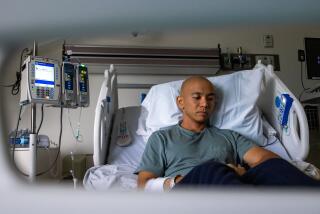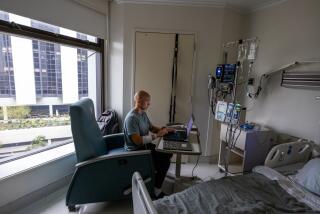Ailing gangster’s offer for visa told
Desperate for a liver transplant at UCLA Medical Center, the leader of Japan’s third-largest organized crime group offered as much as $1 million to potential intermediaries to help him obtain a U.S. visa, according to several people who said they were solicited for assistance.
A private investigator, a business consultant and a lawyer told The Times that between 2001 and 2002 they were separately approached by representatives of Chihiro Inagawa, who told them that UCLA was willing to accept Inagawa as a patient.
But first, Inagawa needed help securing a visa because his gang affiliations prohibited him from being admitted to the United States, the three sources said. The sources, based in the U.S. and Japan, spoke on condition of anonymity for fear of retribution by Japanese criminal gangs or of harming their own business interests.
Two said they personally were offered $1 million in Japanese yen if a visa was issued; the third said he was promised lucrative business deals with a prominent Japanese company.
Inagawa’s gang, the Inagawa-kai, is involved in “drug and arms trafficking, extortion, investment frauds and money laundering,” according to the International Crime Threat Assessment prepared by a working group of U.S. law enforcement and other governmental agencies in 2000.
The sources said they were asked to use their connections -- which included politicians and embassy contacts -- to help get the visa. One said he tried to help Inagawa by making phone calls and writing letters; the others said they didn’t help.
According to one of the three sources, UCLA’s top liver transplant surgeon, Dr. Ronald W. Busuttil, wrote a letter sent to U.S. officials saying that Inagawa needed a liver and that UCLA was willing to perform the transplant.
Another person, Oliver “Buck” Revell, a retired FBI senior executive, said he too made phone calls on Inagawa’s behalf after being approached in 2001 by one of the man’s representatives with whom Revell had a business relationship. Revell, by then a business and security consultant, said Inagawa was seeking surgeries at several U.S. hospitals and had not yet settled on UCLA.
Ultimately, however, Inagawa was not granted a visa to the U.S. because of his gang affiliations, the sources said.
Inagawa, who also went by the first name Yuko, later received a transplant in Australia and died in 2005 at the age of 64.
Inagawa’s efforts came to light in the wake of a recent Times report that between 2000 and 2004, UCLA and Busuttil gave new livers to four other patients with suspected ties to Japanese organized crime groups, commonly known as yakuza.
Two of the patients donated $100,000 each to UCLA within months of their surgeries, although hospital officials say no preferential treatment was given in exchange for the gifts.
The transplants have raised controversy because donor livers are in short supply in the United States. Each year, more than 100 people in the Greater Los Angeles region die waiting for a liver transplant.
UCLA and Busuttil said they could not comment on Inagawa or any transplant patient, citing patient confidentiality.
The hospital, which operates the busiest liver transplant program in the country, has said that it does not make moral decisions about its patients and strictly follows rules governing the nation’s transplant system. Those rules allow hospitals to perform transplants on criminals and on a limited number of foreign patients.
In a written response Thursday to questions from The Times, Busuttil said he knew nothing about the “alleged offers of money made by any foreign patients or their representatives” to gain a visa to the United States.
“No money or donation was offered to me or any foundation affiliated with me as a quid pro quo for getting a visa or getting a transplant” by Inagawa or any of the other Japanese patients, he said.
Busuttil did not directly address whether he wrote a letter to the embassy on Inagawa’s behalf but said he believes that “individuals seeking a U.S. visa for medical treatment are required to substantiate their application with supporting documentation such as a doctor’s letter. If I am asked by a referring doctor to provide such a written medical assessment for a person in dire need of lifesaving medical treatment, I do so.”
The U.S. State Department confirmed that it requires such a letter.
Busuttil went on to say: “I believe it is unethical to discriminate among patients on the basis of nonmedical factors. . . . The healthcare professionals in our liver transplant program have saved the lives of nearly 5,000 babies, children and adults from all walks of life, and of varying nationalities and economic status.”
In Japan, where transplants are rare, many gang members engage in substance abuse, needle-sharing for tattoos and sexual promiscuity, all of which can lead to increased liver problems, experts say. It is not known what caused the liver problems in the Japanese patients who sought transplants at UCLA.
The Westwood medical center had developed a reputation among Japanese organized crime figures as the place to go to for transplants, two of the three sources said. Its appeal grew after Tadamasa Goto, whom law enforcement officials identify as a powerful gang leader, received a new liver at UCLA in 2001 and returned to Japan looking healthy and vibrant, they said.
“UCLA became the place,” said the lawyer, who specializes in finance and has extensive knowledge of gangs in Japan. “That’s how these guys think. One guy does something, the rest of them want to do it.”
UCLA was not the only hospital that the Japanese patients considered, however.
Dr. Spencer Koerner, medical director of the Center for International Health and Telemedicine at Cedars-Sinai Medical Center in Los Angeles, confirmed Thursday that he wrote a letter to U.S. officials in 2002, saying his hospital was willing to perform a transplant on one of the four Japanese patients who later got new livers at UCLA.
Cedars-Sinai’s involvement ended when the patient’s visa was formally rejected because of his gang ties. It is not clear how the patient subsequently was able to get to the United States to receive his transplant at UCLA.
“I’m not judgmental about what people do,” Koerner said. “We take care of patients based on their medical needs. [Gang affiliations] wouldn’t even come into consideration. I wouldn’t want to think about it.”
Transplant rules give hospitals and doctors the final say on which patients get added to their waiting lists, and they have the discretion to refuse patients with unhealthful lifestyles that could compromise the transplant’s success. Patients may be refused on other grounds as well, including an inability to pay.
Finding a hospital to accept Inagawa as a patient proved easier than getting a visa.
Revell, who retired from the FBI in 1994, said he was told by Inagawa’s representative that Inagawa might be willing to trade intelligence on potentially illegal activities in exchange for a visa. Revell said he called the FBI and another law enforcement agency based at the U.S. Embassy in Tokyo, but ended his involvement when he learned that they were not interested.
“I went to the American Embassy and said, ‘This gentleman is trying to get into the United States for surgery. He’s willing to make a large donation to the hospital that lets him in. I suspect he has some nefarious connections, and you tell me if you want him to come in or not,’ ” Revell said.
“They came back and said, ‘We are not interested in his coming in, irrespective of the amount of money that he might contribute’ ” to a hospital or the type of information he was willing to provide.
U.S. law enforcement officials have a long-standing interest in yakuza activities in the United States.
Inagawa’s gang has invested heavily in Hawaii and on the West Coast of the United States, according to the international crime threat assessment.
Representatives for the FBI declined to comment.
Inagawa was trying to follow in the footsteps of Goto, who received the FBI’s help in obtaining a visa before his transplant in exchange for information about potentially illegal Japanese gang activity in this country.
But a retired bureau official said Goto provided no useful information to the FBI.
Two of the sources interviewed for this story said it was their impression that the primary reason Inagawa was denied a visa to enter the United States was because the arrangement with Goto had not worked out.
--
john.glionna@latimes.com
--
On latimes.com
More coverage
For reader comments and earlier related stories go to
latimes.com/uclatransplants.
More to Read
Sign up for Essential California
The most important California stories and recommendations in your inbox every morning.
You may occasionally receive promotional content from the Los Angeles Times.











